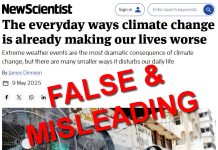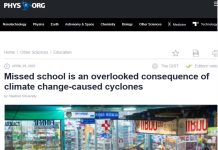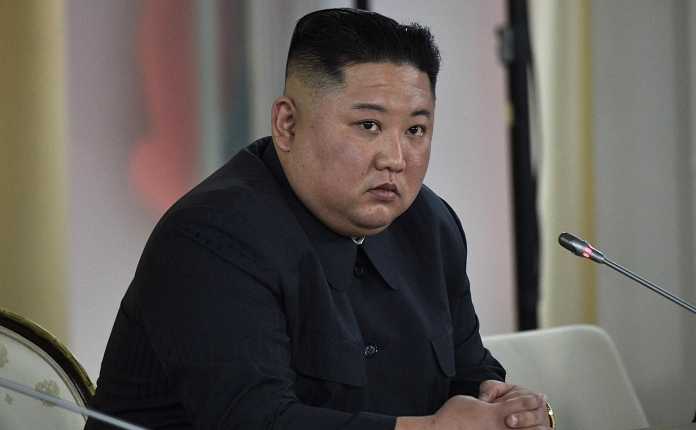North Korea is a failed state not because of Marxism, tyranny, and repression, but because of climate change, argue two prominent climate activists in an article published yesterday by Newsweek. Intelligent people and Climate Realists know better. Here is the evidence:
Climate activists Catherine Dill of the Council on Strategic Risks and Alexandra Naegele of the Woodwell Climate Research Center authored the Newsweek article titled, “How the Climate Crisis Could Further Destabilize North Korea” (as if that’s a bad thing). They argue in their article, “At present, North Korea is facing a food crisis so severe that the government has been forced to release army rations. A perfect storm of back-to-back typhoons last fall, persistent drought this spring, an ongoing summer heatwave, and recent heavy rains have led to the current state of severe food insecurity, even prompting the Kim regime to issue a rare famine warning this spring.”
Wow, that is quite a bit of apologizing and blame-shifting for North Korea’s politically caused famine.
The “perfect storm of back-to-back typhoons” references Hurricane Bavi, which came ashore in August 2020 with barely hurricane-force winds of 83 mph and very quickly lost what marginal strength it had upon landfall. The other was Tropical Storm Haishen, which came ashore in September 2020 and was not close to being typhoon-strength when it made landfall in North Korea with just 65 mph winds. Haishen also quickly dissipated after landfall. Would somebody who is not a Marxist apologist explain how one very weak hurricane in August 2020 and a modest tropical storm in September 2020 explains crop failures for crops that are not planted until eight months later?
Also, a review of NOAA global drought information at https://www.drought.gov/international shows no exceptional drought or wetness in North Korea. Most of the nation is experiencing pretty normal precipitation and soil moisture. Some of the nation is a little wetter than usual, some of the nation is a little drier than usual, and a very small part of the nation is experiencing some significant-but-not-severe drought.
Further, the European Climate Change Service (CCS) maps global temperatures by month. The CCS reports June temperatures in North Korea were pretty much average, while July temperatures were somewhat above average but nothing very exceptional.
Again, this is the context for Marxist-sympathizers Dill and Naegele claiming, “At present, North Korea is facing a food crisis so severe that the government has been forced to release army rations. A perfect storm of back-to-back typhoons last fall, persistent drought this spring, an ongoing summer heatwave, and recent heavy rains have led to the current state of severe food insecurity, even prompting the Kim regime to issue a rare famine warning this spring.”
To be sure, North Korea is indeed experiencing food shortages. Then again, North Korea is pretty much always experiencing food shortages. Is global warming to blame? Let’s look at the objective evidence.
The chart below is presented by The Global Economy, utilizing United Nations Food and Agriculture Organization (FAO) data. The left axis reflects North Korean cereal (rice, wheat, corn) production in kilograms per hectare. The trends for North Korean cereal production per hectare are not very impressive.
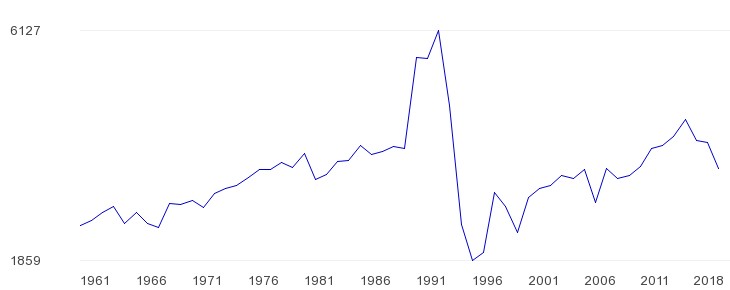
In the next chart, The Global Economy presents South Korean cereal production. In contrast to North Korea, South Korea enjoys consistently improving crop yields as the Earth modestly warms.
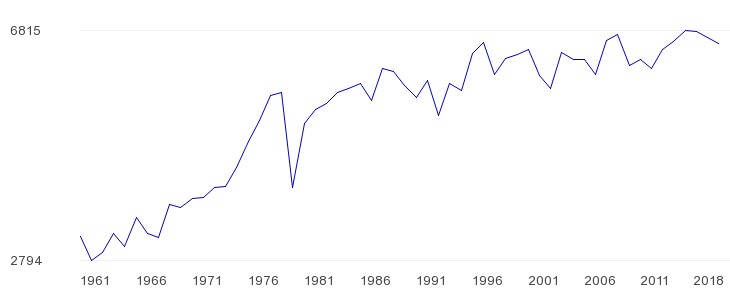
In the next chart, the United Nations FAO documents global cereal production during the past decade. The trend is one of consistent growth, with several new all-time records being set during the past decade.
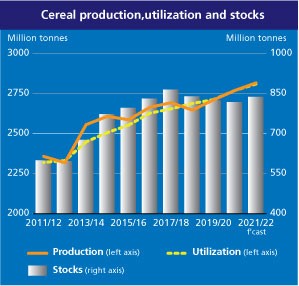
For an even more stunning graph showing a 60-year trend of substantially improving global crop yields, go to https://knoema.com/atlas/World/Cereal-production.
In short, global crop production is continually growing and frequently setting new records. The same holds true for South Korea, which shares the Korean Peninsula with North Korea. The opposite is true for North Korea. Rather than admitting that Marxist totalitarianism is causing the North Korean people’s woes, apologists Dill and Naegele argue that the global warming crisis is maliciously discriminating against North Korea. Or perhaps that North Korea is just the unluckiest country on Earth when it comes to trends in crop yields.
Intelligent people and Climate Realists know better.




